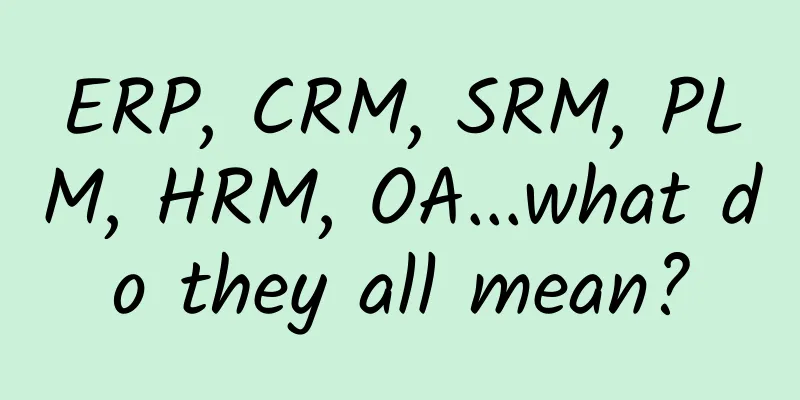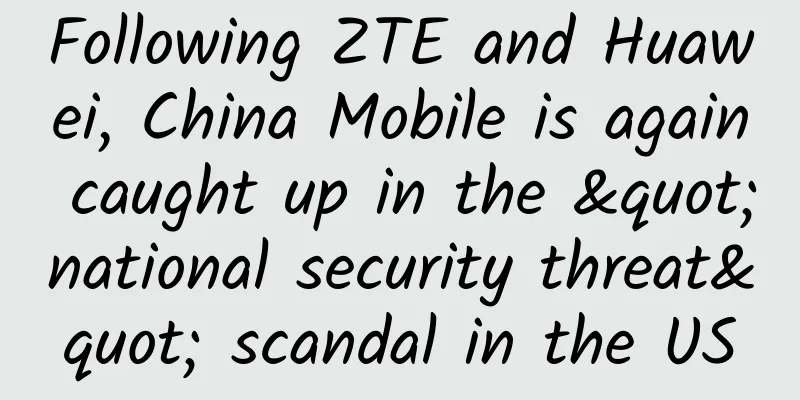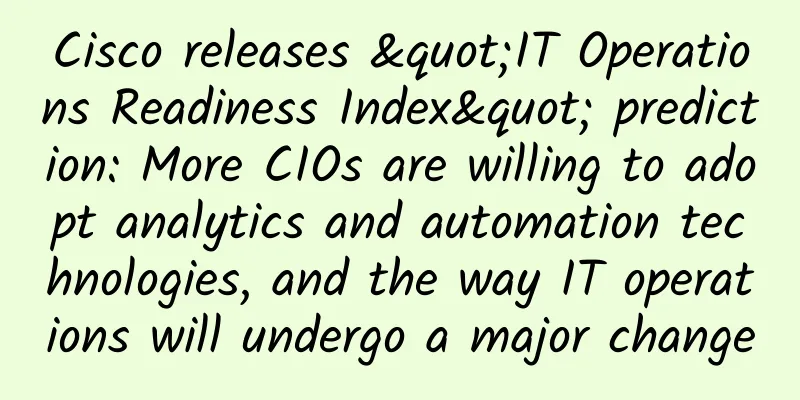ERP, CRM, SRM, PLM, HRM, OA...what do they all mean?

|
When working in a company, you often hear some strange system or platform names, such as ERP, CRM, SRM, PLM, HRM, OA, FOL, etc. What are these systems used for? █ ERP (Enterprise Resource Planning)English full name: Enterprise Resource Planning Definition: Proposed by Gartner Group in the United States in 1990, it is an enterprise management software that provides cross-regional, cross-departmental, and even cross-company integrated implementation information based on management accounting. Enterprise resource planning refers to a management platform that is based on information technology and uses systematic management ideas to provide decision-making and operation means for enterprise decision-makers and employees. Core functional modules: supply chain management, manufacturing management (MRP), quality management, human resources management, and financial management. Typical manufacturers: UFIDA, Kingdee, Dingjie, Guanjiapo, Jushuitan, Oracle, and SAP. █ CRM (Customer Relationship Management)English full name: Customer Relationship Management Definition: It refers to the process in which enterprises use corresponding information technology and Internet technology to coordinate the interaction between enterprises and customers in sales, marketing and services in order to improve their core competitiveness, thereby improving their management methods and providing customers with innovative and personalized customer interaction and services. Its ultimate goal is to attract new customers, retain old customers, and convert existing customers into loyal customers to increase the market. Core functional modules: lead management, customer management, business opportunity management, customer traffic, customer profiling, transaction management, and marketing management. Typical manufacturers: Funshare, SalesEasy, Shenzhou Cloud, Xiaobangbang, Red Circle, Salesforce, hubspot, Zoho, etc. █ SCRM (Social Customer Relationship Management)English full name: Social Customer Relationship Management Definition: It is a customer relationship management system based on social media. Its purpose is to achieve effective communication and interaction between enterprises and customers through social media platforms, thereby improving customer satisfaction and loyalty, and increasing the company's sales and market share. Core functional modules: lead access, multi-scenario customer acquisition, channel ROI analysis customer management, material library management, and transaction management. Typical manufacturers: Chenfeng SCRM, Tanma SCRM, Kuaijing SCRM, Weiban Assistant, and Weiling SCRM. █ SRM (Supplier Relationship Management)English full name: Supplier Relationship Management Definition: It is used to improve the relationship with upstream suppliers in the supply chain. It is a management idea and software technology solution dedicated to establishing and maintaining a long-term, close partnership with suppliers. It is a new management mechanism designed to improve the relationship between enterprises and suppliers. It is implemented in areas related to corporate procurement business. The goal is to establish long-term, close business relationships with suppliers and integrate the resources and competitive advantages of both parties to jointly develop the market, expand market demand and share, reduce the high initial cost of products, and achieve a win-win corporate management model. Core functional modules: sourcing and price comparison, bidding management, purchase application, purchase management, supplier management, supplier performance management, purchase arrival management, warehousing management, and purchase settlement. Typical manufacturers: Zhenyun, Qiqitong █ OA (Office Automation)English full name: Office Automation Definition: A new way of working that combines modern office and computer technology. There is no unified definition of office automation. All the use of new technologies, new machines and new equipment in traditional offices to carry out office business belongs to the field of office automation. By realizing office automation, or digital office, the existing management organization structure can be optimized, the management system can be adjusted, and the collaborative office ability can be increased on the basis of improving efficiency, and the consistency of decision-making can be strengthened. Core functional modules: document management, process specifications, emails, approvals, and notifications. Typical manufacturers: Microsoft, IBM, Feishu, and DingTalk. █ HRM (Human Resource Management)English full name: Human Resource Management Definition: It refers to a human resource management software that analyzes, plans, implements and adjusts all aspects of an enterprise's human resource management to improve the level of an enterprise's human resource management. It can help enterprises select the right people at the right time, arrange them to the right positions, and play their correct roles, thereby achieving the company's correct strategic goals and maximizing economic benefits. Core functional modules: organization management, employee management, attendance management, recruitment management, training management, performance management, salary management, contract file management, etc. Typical manufacturers: Beisen, Zhizheyun, and Wukong. █ SCM (Supply Chain Management)English full name: Supply Chain Management Definition: It is a comprehensive supply chain management solution that aims to coordinate and optimize the supply chain activities inside and outside the enterprise. It covers the entire supply chain process from raw material procurement to product delivery, including supplier management, logistics management, inventory management, order management, etc. The SCM system helps enterprises realize the visualization, coordination and optimization of the supply chain, improve the efficiency and flexibility of the supply chain, reduce costs and provide better customer service. Core functional modules: supplier management, procurement management, logistics and distribution management, delivery planning, shipping and receipt management, acceptance management, inventory management, sales order management, customer management, supplier collaboration, and customer collaboration. Typical manufacturer: Shanghai Qilan. █ MES (Manufacturing Execution System)English full name: Manufacturing Execution System Definition: The system is a production information management system for the workshop execution layer of manufacturing enterprises. Core functional modules: manufacturing data management, planning and scheduling management, production scheduling management, quality management, human resources management, work center/equipment management, tool and fixture management, cost management, project kanban management, production process control, bottom-level data integration analysis, upper-level data integration decomposition and other management modules. Typical manufacturers: Dingjie, Baosight, Bochu, Saiyi, Siemens, Honeywell. █ MOM (Manufacturing Operations Management)English full name: Manufacturing Operation Management Definition: The Instrumentation, System and Automation Society (ISA) began to publish the ISA-SP95 standard in 2000, which established the concept of Manufacturing Operations Management (MOM) for the first time, defined the boundaries of manufacturing operations management in a broader sense, and used it as the general research object and content in this field. It also built a general activity model for application in the four main operating areas of production, maintenance, quality and inventory, and defined in detail the functions of various operating systems and the relationships between various functional modules. Core functional modules: equipment management, production management, planning and scheduling, quality management, warehouse management, resource management, system basic management and system integration and other functional modules. Typical manufacturers: SINOMACH, Ruizhi, Yuangong, and Shugen Interconnect. █ APS (Advanced Planning and Scheduling)English full name: Advanced Planning and Scheduling Definition: It is to solve the production scheduling and production dispatching problems, often called sequencing problems or resource allocation problems. In discrete industries, APS is to solve the optimization scheduling problems of multiple processes and multiple resources; while in process industries, APS is to solve the sequence optimization problem. It solves the optimization problems of sequence and dispatching for the hybrid model of process and discrete at the same time, thus solving the critical chain and cost time minimization for project management and project manufacturing, which is of great significance. Chinese name Advanced Planning and Scheduling. Core functional modules: production planning, MRP calculation, material control, digital scheduling, complete set calculation, material management, BOM management, process route management, system configuration, and integrated management. Typical manufacturers: Andafa, Yipuyou, Siemens, and ZHINIWEI. █ PLM (Product Lifecycle Management)English full name: Product Lifecycle Management Definition: It is a series of application solutions that are applied within a single-location enterprise, within multiple-location enterprises, and between enterprises with collaborative relationships in the field of product research and development. It supports the creation, management, distribution and application of information throughout the product life cycle. It can integrate product-related human resources, processes, application systems and information. Core functional modules: material management, product management, test management, formula management, project management, process management, document management, demand management, cost management, and integrated management. Typical manufacturers: Sipu, Digital Dafang, Tianyu, Dassault Systemes Enova, Siemens, and SAP. █ QMS (Quality Management System)English full name: Quality Management System Definition: It refers to the management system that directs and controls the organization in terms of quality. The quality management system is a systematic quality management model established within the organization, necessary to achieve quality goals, and is a strategic decision of the organization. Core functional modules: sample management, instrument and equipment management, testing configuration, personnel performance appraisal, customer quality management, quality analysis, change management, label management, quality report management, SPC, basic configuration, etc. Typical manufacturers: Hexagon, Huahui, Wanwu, Anbixing, Yunzhi, Siemens, and Kudek. █ Purchase, sales and inventoryDefinition: It is called the purchase and sales chain, which refers to the dynamic management process of purchasing (entry) - warehousing (storage) - sales (sales) in the enterprise management process. Entry: refers to the process of inquiry, purchase, warehousing and payment. Sales: refers to the process of quotation, sales, delivery and collection. Storage: refers to the actions that affect the inventory quantity, including picking, returns, inventory, profit and loss, borrowing, lending, transfer, etc., except for warehousing. Core functional modules: procurement management, sales management, inventory management, and capital management. Typical manufacturers: Guanjiapo, Yongyouhao Business, Kingdee Jingdou Cloud, and Baicao Inventory Management. █ Online customer service systemDefinition: Online customer service, or online front desk, is a web communication technology that uses the website as a medium to provide instant communication between Internet visitors and internal website employees. Online customer service is the foundation of online marketing. Core functional modules: channel access, session allocation, agent management, schedule management, quick reply, knowledge base management, work order system, intelligent customer service, call center. Typical manufacturers: Ronglian Qimo, NetEase Qiyu, Wisdom Tooth Customer Service, and Kuaishangtong. █ OMS (Order Management System)English full name: Ordering Management System Definition: It is a system that receives customer order information and inventory information from the warehouse management system, then classifies the orders by customer and urgency, allocates inventory to different storage locations, and determines the delivery date. Core functional modules: order management, marketing control, product management, inventory management, distribution management, settlement control, delivery exception handling, order splitting and merging, and invoice management. Typical manufacturers: Shangpai, Juyi, and Yum! █ WMS (Warehouse Management System)English full name: Warehouse Management System Definition: It is a real-time computer software system that can manage information, resources, behaviors, inventory and distribution operations more perfectly and improve efficiency according to business rules and algorithms. Core functional modules: Inbound management: batch inbound/partial inbound/return inbound/one product for multiple locations/one product for multiple locations/recommended shelf. Inventory management: dynamic/cycle inventory: inventory adjustment/inventory movement: inventory transfer. Outbound management: order allocation: task package selection/printing single box/multiple box review: weighing handover. Management tools: inventory flow query/interface flow query/inbound order cancellation/outbound order abnormal cancellation. Rule configuration: owner/cargo category batch rule allocation/shelf/replenishment/wave rule task package/data source/printing process/store. Basic information: owner/cargo category/cargo warehouse/shore area/storage location: user/role. Typical manufacturers: Fuller, Juwo, Kejian, Prolog, Infor. █ TMS (Transportation Management System)English full name: Transportation Management System Definition: It is a (web-based) operating software under the "supply chain" group. It can improve the management capabilities of logistics through various methods and other related operations; including managing shipping units, specifying intra-enterprise, domestic and international shipment plans, managing transportation models, benchmarks and costs, maintaining transportation data, generating bills of lading, optimizing transportation plans, selecting carriers and service methods, bidding and tendering, auditing and paying freight bills, handling cargo damage claims, arranging labor and venues, managing documents (especially when shipping internationally) and managing third-party logistics. Core functional modules: resource management (carrier management, driver management, vehicle management), customer management, transportation management (order management, waybill management, loading center, receipt management), quotation management, contract management, settlement management, financial management, integrated management, etc. Carrier side, driver side. Typical manufacturers: Weizhi, Comma Technology, Kejian, Yunling Intelligence, Chuangyun Technology, and Fuller. █ LIMS (Laboratory Information Management System)English full name: laboratory information management system Definition: It is an information management system that combines information technology with database as the core and laboratory management needs. Core functional modules: entrustment management, sample collection management, task management, sample circulation, report management, automatic collection, financial and salary management, label management, equipment management, and laboratory data management. Typical manufacturers: Yuanyu, Songhu, Saiyin, Boshilan, Baima, Qianyiyun. █ Electronics MallDefinition: It is a large-scale electronic commodity trading platform built with e-commerce software. Its main function is to sell products to customers accurately and quickly through the electronic mall trading platform. Core functional modules: Client: Mall homepage, search, product details, order page, shopping cart, personal center. Merchant center (BBC exclusive): product management, order management, marketing tools, payment management, account reconciliation management. Operations: product management, order management, store management, merchant management, payment management, activity management, content management. Typical manufacturers: Youzan, Weimeng, and Shangyue. █ CMS (Content Management System)English full name: Content Management System Definition: It is a software system located between the front-end of the WEB (Web server) and the back-end office system or process (content creation, editing). Content creators, editors, and publishers use the content management system to submit, modify, approve, and publish content. The "content" here may include files, tables, pictures, data in the database, and even videos, and all the information you want to publish to the Internet, Intranet, and Extranet websites. Core functional modules: column management, tag management, article management, advertisement management, site management, material management, and template management. Typical manufacturers: Dreamweaver, Fanke, Empire, WordPress, Drupal, Sitecore. BI (Business Intelligence)English full name: Business Intelligence Definition: It refers to the use of modern data warehouse technology, online analytical processing technology, data mining and data presentation technology to analyze data to realize business value. Core functional modules: self-service analysis, large-screen visualization, Chinese-style reporting, and visual ETL. Typical manufacturers: Fanruan, smartBl, powerBl. Big data platformDefinition: It is a technology based on big data technology and computer network technology. It is a platform for collecting, storing and analyzing large amounts of data to improve business processes and data visualization and other business activities. The data platform aims to create a unified, reliable, continuous and comprehensive data storage, management and retrieval solution to achieve effective data management, auditing, spatiotemporal retrieval, model application, decision analysis and services and other composite applications and services. Core functional modules: data access, data model management, label system management, portrait analysis, automated operation, custom reports, data cockpit, data dashboard, and data big screen. Typical manufacturers: NetEase Youshu, Sensors, and Growthio. |
<<: TCP: Three-way handshake and four-way wave, no blind spot answer in the interview
>>: Kubernetes uses OkHttp client for network load balancing
Recommend
Want to port your number smoothly? Here is a guide to porting your number
Since the official implementation of the "nu...
CloudCone: $17/year-dual-core/1GB/55GB/2TB@1Gbps/Los Angeles data center
Here is some information about CloudCone's re...
How to tell if Wi-Fi 6 is right for you
There is a lot of discussion around the next gene...
MoeCloud: US CN2 GIA line VPS annual payment starts from 299 yuan
MoeCloud also launched a promotion this month, of...
Newbie Science: A Brief Discussion on the Changes in Home Router Security
Routers are the entrance to home networks. In the...
Facebook and Google plan to lay submarine cables from the United States to Southeast Asia
On March 29, according to foreign media reports, ...
Wu Jingtao returns to F5 as new CTO to explain F5's future direction
[51CTO.com original article] Wu Jingtao is the ki...
Application of 5G IoT in Commercial Buildings
The long-awaited 5G technology is finally here. I...
How to choose DCIM, a data center infrastructure management tool?
DCIM (Data Center Infrastructure Management) is a...
RAKsmart: Hot-selling servers, Hong Kong/Korea/Japan/US San Jose dedicated servers starting from $46/month
RAKsmart released information about its promotion...
5G and eSIM drive enterprise IoT growth
New research shows that businesses around the wor...
Communication protocol I2C subsystem Debug
There are two common I2C errors: I2C ACK error, I...
Aruba Helps Home Depot Reinvigorate Its Network to Improve Customer and Employee Experience
Aruba, a subsidiary of Hewlett Packard Enterprise...
2021 Apps UP Competition | Huawei Chen Lifang: The stars will never fade, let’s walk hand in hand
[Beijing, June 10] The 2021 Huawei HMS Global App...
Mushroom CarLink launches an integrated Internet of Vehicles solution to provide users with a seamless "people-car life"
Several years ago, a company proposed a relations...









